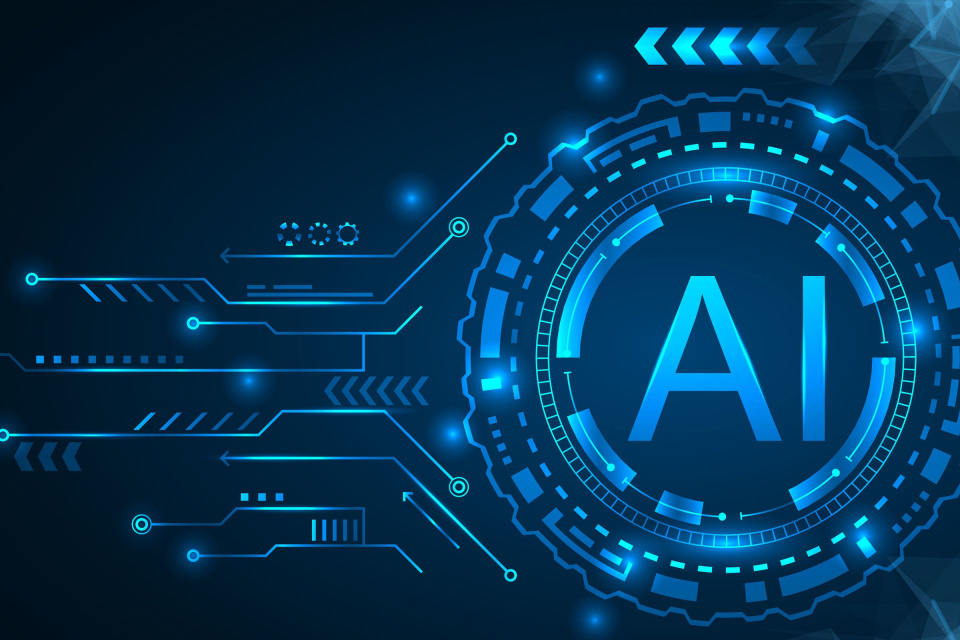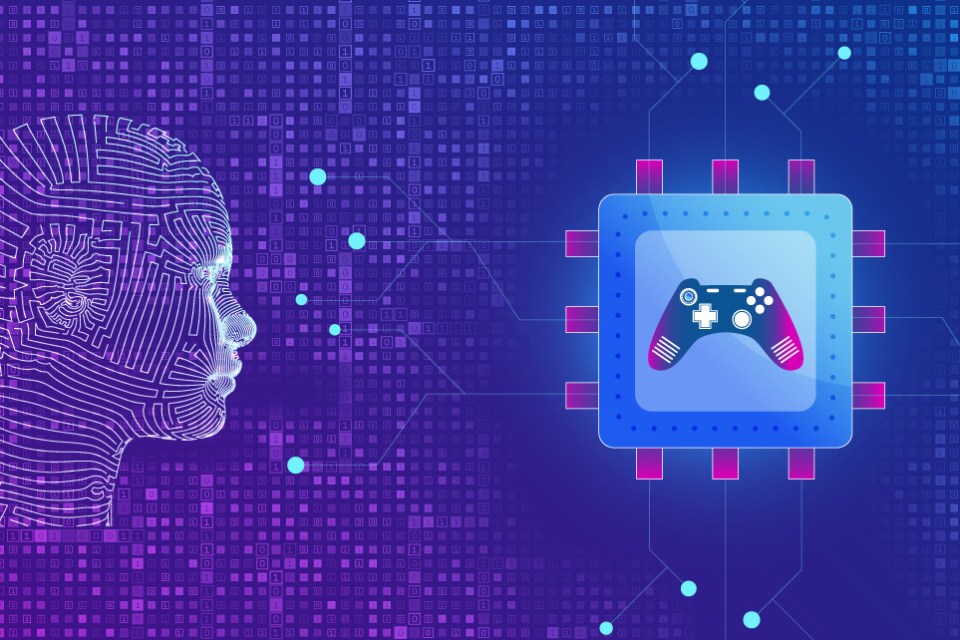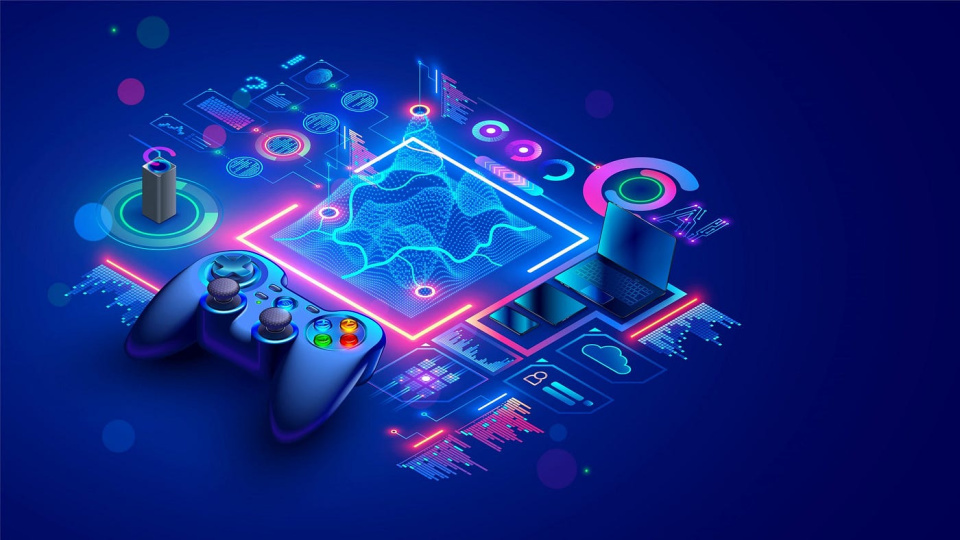AI in game development has revolutionized the industry, empowering developers to create immersive and captivating gaming experiences.
From game design and mechanics to narrative development and testing, AI has become an invaluable tool in pushing the boundaries of creativity.
This article explores the remarkable impact of AI in game development and highlights the effectiveness of various AI-powered solutions.

Table of Contents
AI in Game Design: Enhancing Creativity with Intelligent Solutions
AI in game development has transformed the way games are designed. Leveraging AI algorithms, developers can utilize procedural content generation techniques to automate the creation of game levels, characters, and environments.
This AI-powered approach not only saves time but also enables the generation of dynamic and engaging gameplay experiences.
With AI analyzing player data, game design elements can be tailored to individual preferences, resulting in captivating and personalized gaming adventures.
Revolutionizing Game Mechanics with AI
Game mechanics are at the heart of every gaming experience, and AI has had a profound impact in this area.
By utilizing AI, developers can create non-player characters (NPCs) with advanced behaviors, enhancing the realism and challenge of in-game opponents.
AI-powered systems can adjust difficulty levels in real-time, providing personalized experiences based on player actions.
Moreover, machine learning techniques optimize game mechanics such as pathfinding and procedural generation, offering players more interactive and immersive gameplay.
AI-driven Game Narrative: Crafting Immersive and Personalized Stories
AI has emerged as a game-changer in game narrative development. By harnessing AI technologies, developers can create more immersive and personalized storytelling experiences.
Natural Language Processing (NLP) algorithms enable dynamic dialogue systems, generating contextually relevant responses that enhance player engagement.
AI-powered story generators adapt narratives based on player choices, contributing to nuanced character development and emotionally impactful storytelling.
AI Game Testing: Streamlining Quality Assurance and Bug Detection
AI has revolutionized game testing by introducing innovative approaches that streamline the quality assurance process. AI algorithms simulate various player scenarios, efficiently uncovering potential bugs and glitches. Machine learning algorithms learn from gameplay data, identifying patterns and anomalies to improve game performance and stability. Additionally, AI aids in load testing, ensuring games can handle high player volumes without performance issues, resulting in more polished and reliable gaming experiences.

The Examples:
a) Ludo.ai: Fueling Creativity with AI-generated Game Ideas
Ludo.ai, an AI-powered research and ideation tool for game designers and developers, exemplifies the effectiveness of AI in generating game ideas.
By analyzing market trends and patterns, Ludo.ai simplifies the process of choosing themes and content for new games.
With access to thousands of games in top charts, developers can unlock endless AI-generated ideas to fuel their creativity. Ludo.ai streamlines the creation of game concepts, design elements, and mechanics, presenting fresh game ideas in seconds.
b) Layer.ai: Effortless Game Asset Creation with AI
Layer.ai simplifies the creation and expansion of game assets, reducing the time and expertise required.
By leveraging AI-powered generation, developers can explore unlimited possibilities for character designs, backgrounds, models, and GUI elements.
This user-friendly solution enhances the game development process, allowing developers to maximize their game’s potential with diverse and dynamic assets.
c) Scenario: Empowering Game Creators with AI-generated Assets
Scenario is an innovative platform that empowers game creators without technical expertise to train their own AI for generating unique game assets.
By providing visuals matching the desired art style and using dedicated generators, game creators can bring new assets to life by simply describing them.
Scenario accelerates production, reduces costs, and encourages experimentation, enabling game creators to create high-quality, stylistically consistent assets effortlessly.
With easy accessibility through their web app, Google Play app, or iOS app, Scenario revolutionizes the asset creation process for mobile and video games.
d) ChatGPT: Unleashing Imagination in Game Development
ChatGPT has become a go-to tool for developers and AI enthusiasts, offering a range of applications in game development.
It has been used to recreate beloved classics like Pong, Tetris, and Snake, showcasing its versatility. Additionally, ChatGPT proves useful in writing code for original games and generating captivating story ideas and dialogue for text-based role-playing games.
Even AAA studios recognize its potential, integrating advanced AI as a valuable tool for crafting in-game dialogue.
The collaboration between ChatGPT and game developers highlights the significance of AI in enhancing the creative process and pushing the boundaries of interactive storytelling.

Wrap up
The integration of AI in game development has ushered in a new era of creativity and innovation.
From game design to mechanics, narrative development, and testing, AI-powered solutions have proven to be invaluable tools for developers.
Examples such as Ludo.ai, Layer.ai, Scenario, and ChatGPT demonstrate the effectiveness of AI in generating game ideas, simplifying asset creation, maintaining style consistency, and expanding creative possibilities.
While AI continues to revolutionize game development, it is important to recognize that it complements human expertise and collaboration, rather than replacing it.
The collaboration between AI and game developers will continue to shape unique and compelling gaming experiences, pushing the boundaries of what is possible in the gaming world.
